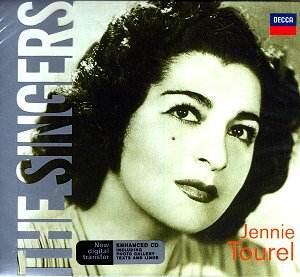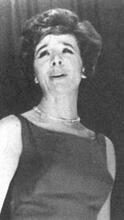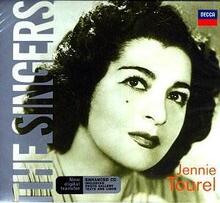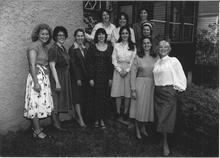Jennie Tourel
Opera singer Jennie Tourel’s subtle and expressive performances made each song she sang into a miniature tone drama that she shaped as closely as possible to the composer’s intention. Fleeing the Russian Revolution, Tourel made her debut as Carmen at the Opéra Comique. After a decade as the star of the Opéra Comique, she made her way to New York, where she sang with the New York Philharmonic and eventually performed at the Metropolitan Opera House. In her forties, Tourel found her calling as a song recitalist and recording artist, known for her expressive voice and her focus on the intentions of the composers in her interpretation of their work. Tourel continued to perform into her seventies, long past the age when most singers retired.
Early Life and Training
Jennie Tourel, universally regarded as one of the most distinguished vocalists of her time, was born in Russia on June 22, 1900. Her father was a merchant who, during the Russian Revolution, took his family first to Berlin, then to Paris. From this period dates her remarkable command of French and German, which stood her in good stead later in her career.
In Paris, Tourel came under the influence of Emil Cooper, who later became a well-known conductor at New York’s Metropolitan Opera House. He coached her in her earliest roles. When he thought she was ready, he brought her to the Opéra Comique. She was engaged to sing Carmen, a role in which she had spectacular success. For the next ten years, she was star of the Opéra Comique, where she also sang the role of Charlotte in Massenet’s Werther and the title role in Thomas’s opera Mignon.
This chapter in Tourel’s life was brought to an abrupt end by the German invasion. With her longtime companion, the gifted painter Yakob Michaelson, she escaped just a week before the Germans entered Paris. Along with other desperate refugees, they set out on a hair-raising journey, part of it by foot, that brought them to Portugal. An epidemic of typhoid was raging in Lisbon, and Tourel became very ill. She had the good fortune to be admitted to a nunnery, where she was taken care of until she recovered. After many difficulties, Tourel and Michaelson obtained the necessary visas for Havana, from which they made their way to Canada and finally reached New York.
Career in America
Tourel’s American career did not get under way at once. She was unknown in the United States, she did not have a manager, and she had barely recovered from the trauma of her abrupt departure from Europe. She tried to make her way into the musical world of New York, at first with no success. Then she made the acquaintance of Friede Rothe, a musical agent who was deeply impressed by the beauty of her voice and became her personal representative. Rothe persuaded Toscanini to give Tourel an audition. The great conductor engaged her to sing with the New York Philharmonic. Soon she also appeared with Koussevitzky and the Boston Symphony and with Stokowski and the Philadelphia Orchestra. In these performances, she was revealed as a star of the first magnitude.
Tourel made her debut at the Metropolitan Opera House singing Adalgisa to Zinka Milanov’s Norma. She also sang Mignon at the old Met. In fact, her voice was not ideally suited to the huge space of the Met. Her subtle art was at its best in the concert hall. As she approached fifty, Tourel became active as a song recitalist. Her recitals became unique events eagerly awaited by an ever larger circle of fans. Her voice, a coloratura mezzo-soprano, was brilliant and agile in the upper register, deeply expressive in the middle range, and with a darkly somber sheen in the lower. She had superb vocal technique and sense of style. Each song she sang became a miniature tone drama that she shaped as closely as possible to the composer’s intention. Her repertory spanned the French, German, and Russian literature. Her extraordinary recordings of Mussorgsky’s Songs and Dances of Death, Debussy’s settings of Verlaine’s poems, Ravel’s Shéhérazade, and the masterpieces of Schubert and Schumann have become collectors’ items.
Jennie Tourel, soprano sings "Floods of Spring," Op. 14, No. 4 by Sergei Rachmaninoff (1873 - 1943), Erich Itor Kahn, pianist
Career in Israel
Tourel, having left Europe as a Jew fleeing from Hitler, remained intensely interested in Jewish affairs. In her later years, she became increasingly involved in the musical life of Israel, and alternated her teaching at the Juilliard School in New York with an annual master class at the Samuel Rubin Academy of Music in Jerusalem. With her first visit in 1949, she was one of the earliest artists of international stature to go to Israel. Her teaching introduced new standards of artistic performance and musicianship to her Israeli students.
Tourel was extremely close to Leonard Bernstein, who wrote his Jeremiah Symphony with her voice in mind. She performed the work with him all over the world. Together they flew to Israel for a historic performance on Mt. Scopus to celebrate the triumphal end of the Six-Day War. Because she had been careful never to force her voice beyond its natural capacity, it retained its sheen when she was past seventy. Indeed, she gave some of her most memorable concerts at an age when many other singers have long since retired.
Legacy
Tourel was an intense woman of vivid personality and powerful temperament. Up to her last years she maintained the highest standards, judged people accordingly, and from herself she expected nothing less than perfection.
Jennie Tourel died on November 23, 1973, at the Lenox Hill Hospital in New York City, of lung cancer aggravated by emphysema. Joseph Machlis established a scholarship in her name at the Samuel Rubin Academy, where she had taught so brilliantly. Leonard Bernstein delivered the eulogy at her funeral. No one who treasures the memory of Tourel, her total artistry, and the enormous impact she had on the art of singing, will ever forget the final words of his tribute: “When Jennie opened her mouth, God spoke.”
NAW modern.
Obituary. NYTimes, November 28, 1973, 84:5.
WWWIA 6.






